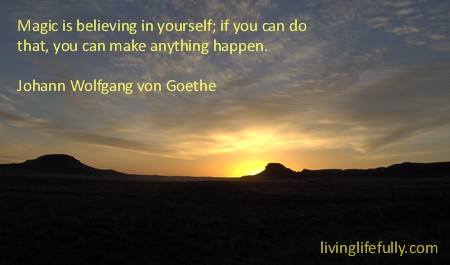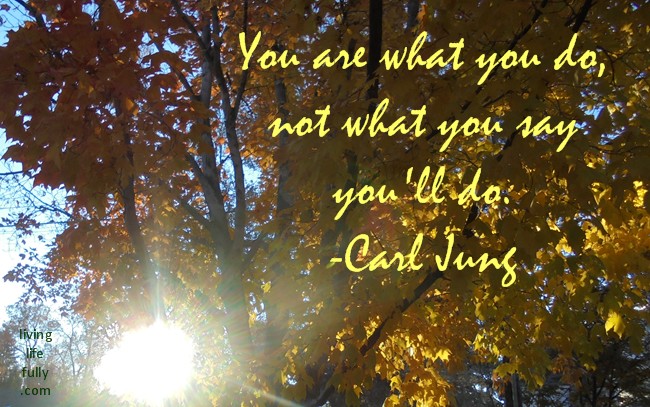|

6 September 2022
| |
|
|
| |
|
Simple and Profound
Thoughts
|
|
Values
are principles and ideas that bring meaning to
the seemingly mundane experience of life. A meaningful
life that ultimately brings happiness and pride requires
you to respond to temptations as well as challenges
with honor, dignity, and courage.
Laura
Schlesinger
|
I expect to pass through the world
but once. Any good therefore that I can do,
or any
kindness or abilities that I can show to any fellow
creature,
let me do it
now. Let me not defer or neglect
it, for I shall not pass this way again.
William Penn
|
|
We should never be ashamed to own
we have been in the
wrong,
which is but saying in other words, that we are
wiser today than
we were yesterday.
Jonathan
Swift
|
Work
is life. Not having something to do with one's life,
something
important or unique to your talents or however
you put it, is a bigger killer than cancer.
Ray Mungo
|
|
| |
|

|
| |
Grow
Down
The Wisdom of Children (an excerpt)
Bernie
Siegel
Love. Accept the miraculous. Be open to
possibilities. Take part in the ongoing act of
creation.
We've heard all this before. We know we should love
one another and enjoy creation. But how?
That's the hard part. Paul was feuding with some of
the other apostles when he wrote the famous love passage
in Corinthians, and the people he was writing to were
arguing among themselves. It is one thing to know
that love is the key to a life of peace and joy, but it is
another thing to be loving.
If you want to become more loving, I can tell you where to
find good teachers. Animals can teach us a lot about
living in the moment and appreciating the day. About
being in the right relationship with God and your fellow
creatures. About not being affected by money and not
moaning and whining about problems.
If you want human teachers, I can tell you where to find
them, too. At lectures and seminars I tell people
they'd be happier if they grew down rather than up.
My adult audiences usually agree when I go on to explain
that many grown-ups aren't very good company. We
listened when people told us, "Grow up. Get
serious." We have a limited view of the
world. There is a sadness about us. We grew
up, got serious, and became depressed adults.
Prophets, mythmakers and storytellers all advise us to be
more childlike. Who inherits the kingdom of
heaven? Who sees the truth about the emperor's new
clothes? Who lives a timeless life?
|

|
As a parent
and physician, I have learned that when you lose the
ability to be childlike you put your life and your health
in danger. Children, sick or well, can teach us
about honesty and feelings. They can show us how to
be loving in the face of adversity and even death. I
have seen many children beat cancer--some by getting well
and others by living fully despite the cancer that ended
their young lives early. Many children with cancer
have written letters and some have written books telling
what they learned from being sick, and those letters and
books are some of the wisest writings I've ever read.
I saw that wisdom of children in my own family many years
ago when it appeared that our son Keith, and the age of
seven, had cancer. He had complained about his leg
hurting and finally, and his urging, we took an x-ray that
showed a defect in the bone. I immediately assumed
cancer. As a physician, I knew that the only
treatment available was an amputation, and that even with
this treatment our beautiful child would probably be dead
in a year. He was scheduled for surgery to biopsy
the tumor, but in the week before his biopsy I viewed him
as dead-within-a-year.
I was already living in a tragic future, mourning a death
that hadn't yet occurred. I couldn't play with the
children or have any fun or make love because I thought I
knew what was going to happen. I wanted to tell all
the children in the house, "Be quiet. Go to
your rooms. Your brother is going to be dead in a
year."
The children knew something was wrong with their brother,
and they knew it might be serious. But they didn't
know the statistics so they did not live in a tragic
future. They went about playing, having fun, living
each day as it came and not worrying about events that
might or might not happen. For that week, I was
separated from the family by my grief. Then the
biopsy results came back and the tumor was a rare but
totally benign growth. So our beautiful son was not
dead-within-a-year and I was able to rejoin the
family. Keith told me I had handled things
poorly. I agreed because I needed him as my
teacher. The experience helped me understand what
the parents of my patients go through, and it also taught
me the folly of living in the future.
You may have heard about living today, tomorrow, or "tonow."
Tonow, children tell us, is a gift, which is why we call
it "the present." Children understand that
tonow is the place to live. The present is really
the only moment we have. Sure, bad things can happen
in the tonow. But when bad things happen to
children, they show us the way again, because they know
how to be in touch with their feelings and needs.
In the last few decades psychologists have studied
survival behavior: Why does one person survive when
another in the same situation perishes? In war or in
accidents or in illness, are there attitudes and behaviors
that increase our chances of surviving? I became
interested in this question in my work with cancer
patients, and over the years I've collected lists of
survival traits. When I give lectures I sometimes
read one of my lists and ask people to guess what
spiritual or self-help group teaches this particular set
of maxims:
Tell the truth.
Do your best no matter how trivial the task.
Choose the difficult right over the easy wrong.
Look out for the group before you look out for yourself.
Don't whine or make excuses.
Judge others by their actions and not by their race or
other characteristics.
Audiences make all kinds of interesting guesses about
which self-help group produced such a wonderful list, but
I've only had one person come up with the right
answer. "The United States Marines," a man
called out one night. He wasn't guessing; he was an
ex-Marine, and he remembered what his instructors had
taught him about survival behavior.
Children don't have drill sergeants to teach them survival
skills, but they know intuitively how to deal with illness
and other threatening situations. They know it is
good to ask--and even to bellow--for help and love.
Adult patients and their families often need to be told
that it is healthy and life-enhancing to express
emotions. Feelings that are not expressed get stored
inside where they become destructive. When you tell
adults this, they are not surprised. Yes, they say,
I know it is unhealthy to repress my feelings. But
they do it anyway. Children, on the other hand, go
ahead and express their feelings freely. Infants are
the real experts. But by the time we become adults
we need to be reminded that feelings should be expressed,
and that noise and love can coexist.
|
|
| |
|

|
|
quotations
- contents
-
welcome
page
-
obstacles
the
people behind the words
-
our
current e-zine
-
articles
and excerpts
Daily
Meditations, Year One - Year
Two - Year Three
- Year Four
Sign up
for your free daily spiritual or general quotation ~ ~ Sign
up for your free daily meditation
|
| |
|

|
We
have some
inspiring and motivational books that may interest you. Our main way of supporting this site is
through the sale of books, either physical copies
or digital copies for your Amazon Kindle (including the
online reader). All of the money that we earn
through them comes back to the site
in one way or another. Just click on the picture
to the left to visit our page of books, both fiction and
non-fiction! |
|
| |
|

|
| |
A
Foolproof Formula for Success
An
excerpt
Arthur Gordon
When I was asked to give the commencement address at a
nearby college, a friend said to me, "It's
easy. All you have to do is give 'em a foolproof
formula for success!"
It was said jokingly, but the remark stuck in my
mind. And the more I thought about it, the more
convinced I became that there is a foolproof
formula for success, available to anyone wise enough to
recognize it and put it to work.
In American industry the competition for promising
personnel is terrific. Year after year
businesspeople study college records, screen applicants,
and offer special inducements to proven people. What
are they after, really? brains? energy? know-how?
These things are desirable, sure. But they will
carry a person only so far. If one is to move to the
top and be entrusted with command decisions, there must be
a plus factor, something that takes mere ability and
doubles or trebles its effectiveness. To describe
this magic characteristic there's only one word: integrity.
Basically, the word means wholeness. In
mathematics, an integer is a number that isn't divided
into fractions. Just so, a person of integrity isn't
divided against him or herself. They don't think one
thing and say another--so it's virtually impossible for
the person to lie. They don't believe in one thing
and do another--so one is not in conflict with one's own
principles. It's the absence of inner warfare, I'm
convinced, that gives a person the extra energy and
clarity of thought that make achievement inevitable.
Integrity really means having a
certain built-in set of attitudes. Let me give you
examples.
Integrity means living up to the best in yourself.
Years ago, a writer who had lost a fortune in bad
investments went into bankruptcy. His intention was
to pay off every cent he owed, and three years later he
was still working at it. To help him, a newspaper
organized a fund. Important people contributed
heavily to it. It was a temptation--accepting would
have meant the end of a wearing burden. But Mark
Twain refused, and returned the money to the
contributors. Seven months later, with his new book
a hit, he paid the last of his debts in full.
Integrity means having a highly developed sense of
honor. Not just honesty, mind you, honor.
The great Frank Lloyd Wright once spoke of this to the
American Institute of Architects. "What,"
he asked, "might this sense of honor be? Well,
what is the honor of a brick; what would be an honorable
brick? A brick brick, wouldn't it? What
would be the honor of a board? It would be a good
board, wouldn't it? What is the honor of a
person? To be a true individual." And
that's exactly what Frank Lloyd Wright was: an
individual true to his own standards and hence to himself.
Integrity means having a conscience and listening to
it. "It is neither safe nor prudent,"
said Martin Luther, facing his enemies in the city where
his death had been decreed, "to do aught against
conscience. Here I stand; God help me, I cannot do
otherwise."
Integrity means having the courage of your convictions.
This includes the capacity to cling to what you think is
right, to go it alone when necessary, and to speak out
against what you know is wrong. In the operating
room of a great hospital a young nurse had her first day
of full responsibility. "You've removed eleven
sponges, doctor," she said to the surgeon.
"We used twelve."
"I've removed them all," the doctor
declared. "We'll close the incision now."
"No," the nurse objected. "We
used twelve."
"I'll take the responsibility," the
surgeon said grimly. "Suture!"
"You can't do that!" blazed the
nurse. "Think of the patient."
The doctor smiled, lifted his foot, showed the
nurse the twelfth sponge. "You'll do," he
said. He had been testing her for integrity--and she
had it.
Integrity means obedience to the unenforceable.
In a way, this is the heart of it. No one can force
you to live up to the best in yourself. No one can compel
you to get involved. No one can make you obey
your conscience. A person of integrity does these
things anyway.
During World War II, when our armies were slashing across
France, an American colonel and his jeep driver took a
wrong turn and ran into an oncoming German armored
column. Both men jumped out and took cover, the
sergeant in some roadside bushes, the colonel in a culvert
under the road. The Germans spotted the sergeant and
advanced on him, firing. The colonel could easily
have remained undetected. He chose, instead, to come
out fighting--one pistol against tanks and machine
guns. He was killed. The sergeant, taken
prisoner, told the story later. Why did the colonel
do it? Because his concept of duty, though
unenforceable, was stronger than his regard for his own
safety.
Difficult? Yes. That is why true integrity is
rare, and admired. But in terms of ultimate reward
it's worth all the effort. Just consider a few of
the dividends that integrity pays:
Boldness. Integrity gives a person the
strength to take chances, welcome challenge, reject the
unsatisfactory-but-safe for the unknown-with-chance-for-
improvement. A person of integrity has confidence
and can believe in him- or herself--because that person
has no reason to distrust him- or herself.
Persistence. Integrity often shows up as an
unshakable single-mindedness of purpose, a tenacity that
refuses to give up. "Never give in!" said
Winston Churchill. "Never, never, never,
never. In nothing great or small, large or
petty--never give in except to convictions of honor and
good sense." And he never did.
Serenity. People of integrity, I've noticed,
are shock-resistant. They seem to have a kind of
built-in equanimity that enables them to accept setbacks,
or even injustices. Harry Emerson Fosdick tells how
Abraham Lincoln was warned by his friends not to make a
certain speech while campaigning for the U.S. Senate in
1858. Lincoln replied, "If it is decreed that I
should go down because of this speech, then let me go down
linked to the truth." He was serene. He
did go down, but two years later he became president.
There are many other benefits that integrity brings a
person: friendship, trust, admiration,
respect. One of the hopeful things about the human
race is that people seem to recognize integrity almost
instinctively--and are irresistibly attracted to it.
How does one acquire it? I'm sure there's no pat
answer. I think perhaps the first step is schooling
yourself to practice total honesty in little things:
not telling the small lie when it's inconvenient to tell
the truth; not repeating that juicy bit of gossip that is
quite possibly untrue; not charging that personal phone
call to the office.
Such discipline may sound small, but when you really seek
integrity and begin to find it, it develops its own power
that sweeps you along. Finally you begin to see that
almost anything worth having has an integrity of its own
that must not be violated.
A foolproof formula for success? Yes. It's
foolproof because--regardless of fame, money, power, or
any of the conventional yardsticks--if you seek and
find integrity, you are a success.
|
|
| |
|

|
|
Living
Life Fully, the e-zine
exists to try to provide for visitors of the world wide web a
place
of growth, peace, inspiration, and encouragement. Our
articles
are presented as thoughts of the authors--by no means do
we
mean to present them as ways that anyone has to live
life. Take
from them what you will, and disagree with
whatever you disagree
with--just know that they'll be here for you
each week. |
|
| |
|
Those
who every morning plan the
transactions of the day and follow out that plan
carry
a thread that will guide them through the labyrinth of the
most busy life.
The orderly arrangement of their time is
like a ray of light which darts itself
through all their occupations. But where no plan is laid, where the
disposal of time
is surrendered merely to the chance of
incidents, chaos will soon reign.
Victor Hugo
|
| |

|
Your
New Chapters
I
often look at my life as segments, as chapters in
the story that I'm living out day after day.
There are many times in my life when it seems pretty
obvious that one chapter is ending, while another is
beginning. Sometimes it's the result of
something rather dramatic, such as a job change or a
move to another place; other times, the changes are
much more subtle, such as not seeing a certain
friend nearly as much, or improving the way I do my
job or changing the way I eat.
No matter what the change, though, it's fascinating
to think of starting anew in life. I know many
people who don't really know what it's like to start
anew, because they're afraid of letting go of the
past, afraid of venturing into the unknown and
taking what probably will be significant
risks. But when I look at such changes as
chapters, I realize that with any change that I go
through in life, I have the benefit of bringing
along with me all my prior learning and experience,
but I also have the possibility of leaving behind me
all of the negative experiences and feelings.
As I write new chapters in my life through my words
and deeds and actions and reactions, I really do
have a choice as to how I want the new chapter to
proceed.
I also keep in mind that in many ways, I'm creating
more than one book and living through the chapters
of several books at a time. After all, the
book of my relationships moves on to new chapters at
different times than does the book of my work.
I may learn something very important about how I
relate to other people at one time, yet learn
something important about my job--or move on to
another job--at a completely different time.
While I begin the next chapter of the book of my
spirituality next week, I may be stuck in the same
chapter of the book of my intellectual growth until
next spring.
I like to see these books as reflections of growth,
not simply as changes. I like to see the
chapters as having positive progressions as I leave
behind unhelpful habits and limited ways of thinking
and destructive ways of treating other people, and
move on to doing helpful things, thinking more
productively and positively, and treating other
people in constructive ways. It really is my
choice, of course, because I choose if I'm going to
learn and grow, or if I'm going to stay stuck in the
same patterns that hold me back and hold me down.
How many of us would like to imagine starting a new
job and immediately getting stuck in old habits of
complaining and being bored and getting stuck in
ruts? How many of us would want the new job to
turn into exactly what the old job was after a month
or two, except for a different setting and different
people around us? But that's exactly what
happens to many, many people in the world who don't
use the job as an opportunity to write new
stories--stories about being helpful to their
co-workers, about excelling at what they do instead
of doing adequate work, about learning all they can
about their job and responsibilities and getting
really good at it all.
How many of us would like to move to a new city and
have our lives become exactly what they were in the
old city after a few weeks? Wouldn't we rather
be taking advantage of new opportunities and seeing
new things and learning about our new
environment? Unfortunately, many people move
to a new city and spend their free time with the
same old TV shows or video games, never finding out
just what the new place has to offer. They
follow the same patterns that they followed in the
previous chapter, and this new chapter becomes a
repeat of the last one, with simply a different
setting and different names.
Thinking about life in chapters is helpful to me
because in times of trouble or stress, I can always
remind myself that this chapter, too, shall come to
an end. Since being laid off eighteen months
ago, for example, the chapters that I've written
have been difficult, at best, though still
positive. I keep in mind, though, that the
difficulties will come to an end as long as I
persevere and do my best to make the most of my
situations.
Thinking this way also helps me to excel in whatever
I do, because I know that I don't necessarily need
to see myself as building a strong life--which would
look like an overwhelming task--but as creating
strong chapters that comprise the overall whole of
my life. And positive parts work together to
create a positive whole.
We can start a new chapter any time we want.
We can end the previous chapter with the words
"And then he or she decided that a change was
needed, and started. . . ." The new
chapter would begin perhaps with words like,
"Although it was difficult at first, she or he
soon started to see the positive results of the
changes in life." And after that, we
would talk about the difficulties that the changes
caused and then the positive results of it
all. Starting a new chapter doesn't have to be
an intimidating, ominous task; it can simply be a
few minor changes in habits or attitude or
perspective.
Our lives are made up of chapters, and we all go
through our lives writing many different books at
once. Once we're aware of this dynamic,
wouldn't it be nice to be writing our own new
chapters instead of hanging around and hoping that
life writes them for us? It definitely is
within our power to be doing so.
|
|
|
|
|
| |
|

|
| |
|
HOME
- contents - Daily
Meditations - abundance - acceptance
- achievement
- action
- adversity
-
advertising
- aging - ambition
anger
- anticipation
- anxiety - apathy - appreciation -
arrogance
- art - attitude
- authenticity
- awakening - awareness
-
awe
balance - beauty
-
being yourself
- beliefs
- body
- brooding
- busyness - caring -
celebration
- challenges -
change - character
charity - children
-
choices
-
Christianity
- coincidence
- commitment
- common
sense
- community
- comparison - compassion
competition - complaining
- compliments -
compromise
- confidence - conformity
- conscience
-
contentment - control
- cooperation
courage -
covetousness
- creativity
- crisis - criticism
-
cruelty
- death
- decisions
- desire
- determination
- disappointment
discipline -
discouragement - diversity -
doubt - dreams
- earth - education -
ego - emotions -
encouragement
- enlightenment
enthusiasm - envy
- eternity
- ethics - example - exercise - experience - failure
-
faith
- fame
- family - fate - fathers
-
fault-finding
fear
- feelings - finances
- flowers - forgiveness
-
freedom
- friendship
- frustration - fun - the future
- garden of life - gardening
generosity -
gentleness
- giving
- goals - God
- goodness
- grace -
gratitude
- greatness
- greed
- grief - growing up
- guilt -
habit
happiness
- hatred
- healing
-
health -
heart
- helpfulness
- home - honesty
- hope
- hospitality - humility
- hurry
-
ideals - identity
idleness - idolatry
- ignorance
- illusion -
imagination - impatience
-
individuality
- the inner child - inspiration -
integrity - intimacy
introspection - intuition
- jealousy
- journey of life - joy
- judgment - karma - kindness
-
knowledge - language
- laughter
-
laziness
leadership
-
learning - letting
go - life
- listening - loneliness
- love
- lying - magic - marriage
-
materialism
- meanness
- meditation
mindfulness
- miracles
-
mistakes - mistrust
- moderation - money -
mothers
- motivation - music - mystery
- nature
-
negative
attitude
now -
oneness
- open-mindedness
- opportunity
-
optimism
-
pain - parenting - passion
- the past - patience
-
peace -
perfectionism
perseverance
- perspective - pessimism
- play
- poetry -
positive
thoughts
- possessions
-
potential - poverty -
power - praise
prayer
- prejudice
- pride - principle
- problems - progress
- prosperity
- purpose
- reading -recreation
- reflection
- relationships
religion
- reputation - resentment
-
respect - responsibility
- rest - revenge
-
risk - role models
- running -
ruts - sadness
-
safety
seasons of
life - self - self-love
-
self-pity
-
self-reliance - self-respect
- selfishness - serving others - shame
- silence
- simplicity
slowing
down - smiles
-solitude - sorrow -
spirit -
stories -
strength - stress
- stupidity
- success -
suffering - talent
the tapestry of life - teachers - thoughts
- time
- today - tolerance
-
traditions
-
trees
-
trust
- truth - unfulfilled
dreams
- values
vanity
- virtue
- vulnerability - walking - war
- wealth - weight
issues - wisdom
-
women -
wonder - work
-
worry - worship
youth
- spring - summer
- fall - winter
-
Christmas - Thanksgiving
-
New Year - America
-
Zen sayings -
articles
& excerpts
Native American
wisdom
-
The Law of Attraction -
obstacles to
living
life fully
- e-zine archives
-
quotations
contents
our most recent e-zine - Great
Thinkers - the people behind the words
|
| |
|
 ™ ™
|
|
All contents
© 2022 Living Life Fully™,
all rights reserved.
Please feel
free to re-use material from this site other than
copyrighted articles--
contact each author for permission to use those.
If you use material, it would be
greatly appreciated if you would provide credit and
a link back to the original
source, and let us know where the material is
published. Thank you. |
|
| |
|
I have come to
suspect that life itself may be a spiritual practice. The
process
of daily living seems able to refine the quality of our humanity over
time. There are
many people whose awakening to larger realities comes through
the
experiences of
ordinary life, through parenting, through work, through friendship,
through illness,
or just in some elevator somewhere.
Rachel Naomi Remen
|

|
|
| |
|
The next
time you see geese heading south for the winter, flying along in
"V" formation, you might consider what science has
discovered as to why they fly that way. As each bird flaps its
wings, it creates an uplift for the bird immediately following.
By flying in "V" formation the whole flock adds at least 71
percent greater flying range than if each bird flew on its own.
People who share a common direction and sense of community can get
where they are going more quickly and easily, because they are
traveling on the thrust of one another.
When a goose falls out of formation, it suddenly feels the drag and
resistance of trying to go it alone--and quickly gets back into
formation to take advantage of the lifting power of the bird in front.
If we have as much sense as a goose, we will stay in formation with
those people who are headed the same way we are.
When the head goose gets tired, it rotates back in the wing and
another goose flies point.
It is sensible to take turns doing demanding jobs, whether with people
or with geese flying south.
Geese honk from behind to encourage those up front to keep up their
speed.
What message do we give when we honk from behind?
Finally, and this is important--when a goose gets sick or is wounded
by gunshot and falls out of formation, two other geese fall out with
that goose and follow it down to lend help and protection. They
stay with the fallen goose until it is able to fly or until it dies;
and then only do they launch out on their own, or with another
formation to catch up with their group.
If we have the sense of a goose, we will stand by each other like
that!
unattributed
|
|
| |
|
|

|
| |
|
The
history of every country begins in the heart of a man and a
woman. . . .
And now the old story has begun to write itself
over again. Isn't it queer;
there are only two or three
human stories, and they go on repeating
themselves as fiercely
as if they had never happened before; like the larks
in this
county, that have been singing the same five notes
over and over
for thousands of years.
Willa Cather
O! Pioneers
|
| |
|
